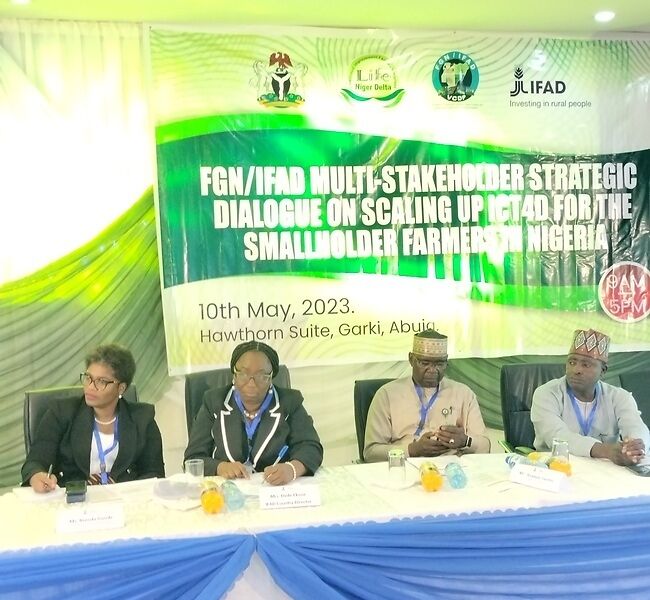The International Fund for Agriculture Development (IFAD) has rallied stakeholders locally and internationally to harmonize interventions on Information Communication Technology for Development (ICT4D) for smallholder farmers.
IFAD while acknowledging that there are various projects and programmes by agencies, organisations and donors in the areas of ICT4D for smallholder farmers across the country, emphasised the need to harmonize these interventions to avoid duplication of projects and loss of funds.
ICT4D is an initiative aimed at ensuring equitable access to up-to-date communications technologies to aid economic development. ICT4D involves using any communication device such as radio, television, mobile phones, computers and network hardware and software, satellite systems among others, as well as the various services and associated applications to achieve a wider coverage or outreach with vital information that would aid development of smallholder farmers.
The Nigerian Country Director of IFAD, Mrs Dede Ekoue while speaking at a Multi Stakeholder Strategic Dialogue on Scaling up of ICT4D to Empower Smallholder Farmers said the meeting aims at sharing ideas on how the stakeholders will work together instead of working in isolation.
The IFAD Nigeria country programmes’ adoption and integration of ICT4D have been limited in scale and scope. In line with national policies and strategies, the country program is poised to scale up the adoption and integration of ICT4D to drive agricultural transformation and improve the livelihoods of smallholder farmers.
In this meeting, IFAD seeks to partner with relevant Government Agencies and private organizations in ICT and Agricultural sector to identify simple ICT solutions and technologies for use of smallholder farmers in Nigeria to promote inclusive and sustainable economic growth and better use of data/information.
“The challenge we have now is that we know that different stakeholders are doing something about ICT4D for farmers, but the challenge is still big because we have to make sure that we do it in a way that allows our to reach large number of smallholder farmers using this solution.
“We have to also think about affordability for these smallholder farmers and we have cushion ourselves on how to do it in a way that actually benefits the farmers in terms of economic empowerment, resilience and others.
“So, how can we work together instead of working in isolated manner; each project has its own solution and each donor has its solution and agencies have its own solution that are working but are not being brought to scale, so those are the elements that are before us.
“We will have the opportunity during this forum to exchange best practices in Nigeria and also to learn from global best practices”, Ekoue said.
She said the objective of the meeting is “to promote a shared understanding of the current status, challenges and opportunities in the use of ICT4D among smallholder farmers
“To facilitate a common understanding of best practices for an enabling environment and optimal entry points for ICT4D implementation
To highlight key priorities for scale-up of ICT4D for smallholder farmers and to unlock data in an ICT4D environment and
“To formulate key recommendations to scale-up ICT4D for smallholder farmers, including but not limited to working through the next COSOP period (2024 – 2029), new and existing development projects and partnerships”.
In his address, the Permanent Secretary, Federal Ministry of Agriculture and Rural Development, Dr Ernest Umakhihe said ICT4D initiative is the commitment of the Nigerian
Government and IFAD to addressing emerging constraints along the agricultural commodity value chains leveraging digital technologies to facilitate access to market information and financial services as well as agri-food systems transformation.
Umakhihe who was represented by the Director of Planning in the Ministry, Alhaji Ibrahim Taminu said ICT4D has great potential in agriculture and it enables farmers to make more informed daily decisions regarding farming operations, leading to improved productivity and profitability as well as increased resilience to rural farmers.
“I would wish to reiterate that sharp integration of ICT4D into the COSOP design is
coming at the time Nigeria farmers desire it most, with high expectations to boost productivity and secure access to better food, healthy diets and reduce farmers stress and rural poverty.
“We must invest massively in ICT4D for the empowerment of smallholder farmers to fight against hunger as well as inherent food wastes in the value chains and widen the gap in the adoption of new technologies as farmers would have access to a variety of information sources that they consult for regular agricultural information”, he added.






